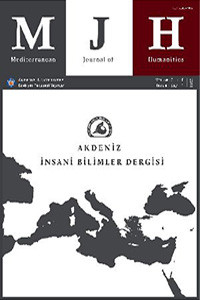Abstract
Mezirow (1991) defines transformative learning as a theory about constructing meaning, not just about knowledge acquisition, and the construction of meaning is about learning through critical reflection, rather than mindlessly or unquestioningly acquiring frames of reference through life experiences. Mezirow (1997) emphasizes that transformative learning is rooted in the way human beings communicate, and does not link it exclusively with the significant life events of the learner. Thus, the individual can make shifts in his/her world view and this can result in a more inclusive world-view. This qualitative article based upon transformative learning theory presents the common changes and transformations of three adults, following their movement to a new city and university as academicians.
References
- Clark M. & Wilson A. (1991). “Context and Rationality in Mezirow’s Theory of Transformational Learning”. Adult Education Quarterly 41/2 (1991) 75-91.
- Cranton P. & Roy M. (2003). “When the Bottom Falls Out of the Bucket: Toward a Holistic Perspective on Transformative Learning”. Journal of Transformative Education 1/2 (2003) 86-98.
- King K. P. (2002). A Journey of Transformation: A Model of Educators’ Learning Experiences in Educational Technology. Eds. J. M. Pettit & R. P. Francis. Raleigh 2002.
- Kitchenham A. (2008). “The Evolution of John Mezirow’s Transformative Learning Theory”. Journal of Transformative Education 6/2 (2008) 104-123.
- Mezirow J. (1978). “Perspective Transformation”. Adult Education Quarterly 28/2 (1978) 100-110.
- Mezirow J. (1991). Transformative Dimensions of Adult Learning. San Francisco 1991.
- Mezirow J. (1997). “Transformative Learning: Theory to Practice”. Eds. S. Imel, J. M. Ross-Gordon & J.
- E. Coryell. New Directions for Adult and Continuing Education (1997) 5-12.
- Mezirow J. (2003). “Transformative Learning as Discourse”. Journal of Transformative Education 1/1 (2003) 58-63.
- Piaget J. (1985). Equilibration of Cognitive Structures. Chicago 1985.
- Schmidt H. G, Rotgans J. I, Yew E. HJ (2011). “The Process of Problem-Based Learning: What Works and Why”. Medical Education 45/8 (2001) 7.
- Scott S. (2006). “A Way of Seeing: Transformation for a New Century”. Eds. T. Fenwick, T. Nesbit & B.
- Spencer. Contexts of Adult Education: Canadian Perspectives (2006) 153-161. Toronto.
- Taylor E. W. (2006). “A Critical Review of the Empirical Research of Transformative Learning (1999-2005)”. The Adult Education Research Conference, Minneapolis, MN.
- Thorndike E. L. & Woodworth R. S. (1901) “The Influence of Improvement in One Mental Function Upon the Efficiency of Other Functions”. Psychological Review 8/4 (1901) 384-395.
- Wyandotte A. & Huh S. (2012). Of Toads, Gardens, and Possibilities: A Phenomenological Approach to Transformative Education.
Abstract
References
- Clark M. & Wilson A. (1991). “Context and Rationality in Mezirow’s Theory of Transformational Learning”. Adult Education Quarterly 41/2 (1991) 75-91.
- Cranton P. & Roy M. (2003). “When the Bottom Falls Out of the Bucket: Toward a Holistic Perspective on Transformative Learning”. Journal of Transformative Education 1/2 (2003) 86-98.
- King K. P. (2002). A Journey of Transformation: A Model of Educators’ Learning Experiences in Educational Technology. Eds. J. M. Pettit & R. P. Francis. Raleigh 2002.
- Kitchenham A. (2008). “The Evolution of John Mezirow’s Transformative Learning Theory”. Journal of Transformative Education 6/2 (2008) 104-123.
- Mezirow J. (1978). “Perspective Transformation”. Adult Education Quarterly 28/2 (1978) 100-110.
- Mezirow J. (1991). Transformative Dimensions of Adult Learning. San Francisco 1991.
- Mezirow J. (1997). “Transformative Learning: Theory to Practice”. Eds. S. Imel, J. M. Ross-Gordon & J.
- E. Coryell. New Directions for Adult and Continuing Education (1997) 5-12.
- Mezirow J. (2003). “Transformative Learning as Discourse”. Journal of Transformative Education 1/1 (2003) 58-63.
- Piaget J. (1985). Equilibration of Cognitive Structures. Chicago 1985.
- Schmidt H. G, Rotgans J. I, Yew E. HJ (2011). “The Process of Problem-Based Learning: What Works and Why”. Medical Education 45/8 (2001) 7.
- Scott S. (2006). “A Way of Seeing: Transformation for a New Century”. Eds. T. Fenwick, T. Nesbit & B.
- Spencer. Contexts of Adult Education: Canadian Perspectives (2006) 153-161. Toronto.
- Taylor E. W. (2006). “A Critical Review of the Empirical Research of Transformative Learning (1999-2005)”. The Adult Education Research Conference, Minneapolis, MN.
- Thorndike E. L. & Woodworth R. S. (1901) “The Influence of Improvement in One Mental Function Upon the Efficiency of Other Functions”. Psychological Review 8/4 (1901) 384-395.
- Wyandotte A. & Huh S. (2012). Of Toads, Gardens, and Possibilities: A Phenomenological Approach to Transformative Education.
Details
| Primary Language | Turkish |
|---|---|
| Subjects | Educational Sociology |
| Journal Section | Araştırma Makaleleri |
| Authors | |
| Publication Date | June 30, 2016 |
| Published in Issue | Year 2016 Volume: 6 Issue: 1 |
| Adres: Akdeniz İnsani Bilimler Dergisi Akdeniz Üniversitesi, Edebiyat Fakültesi 07058 Kampüs, Antalya / TÜRKİYE | E-Posta: mjh@akdeniz.edu.tr |


